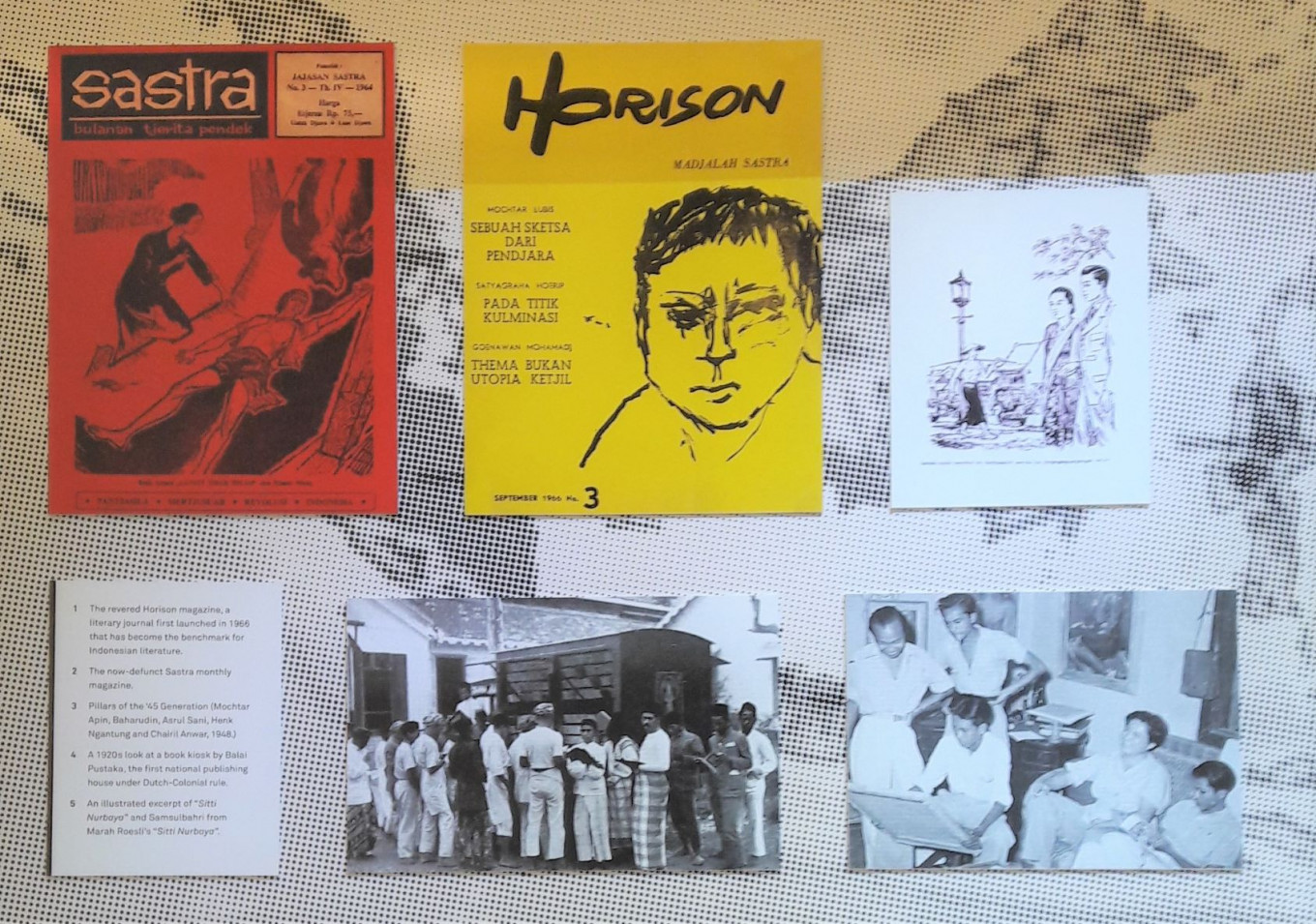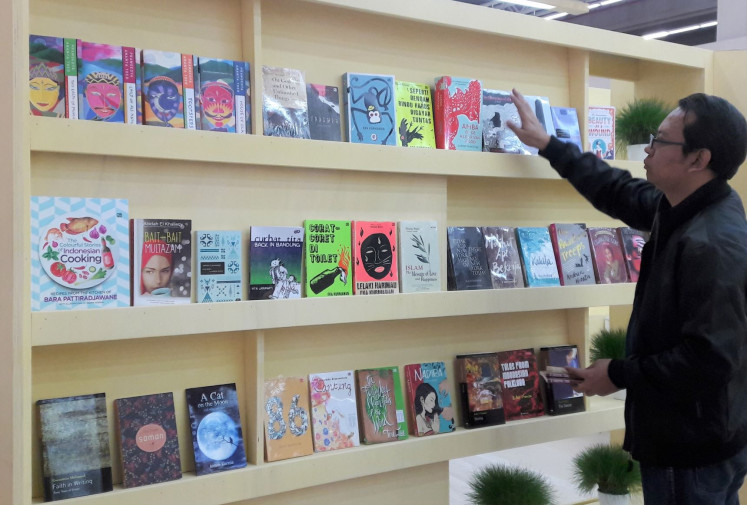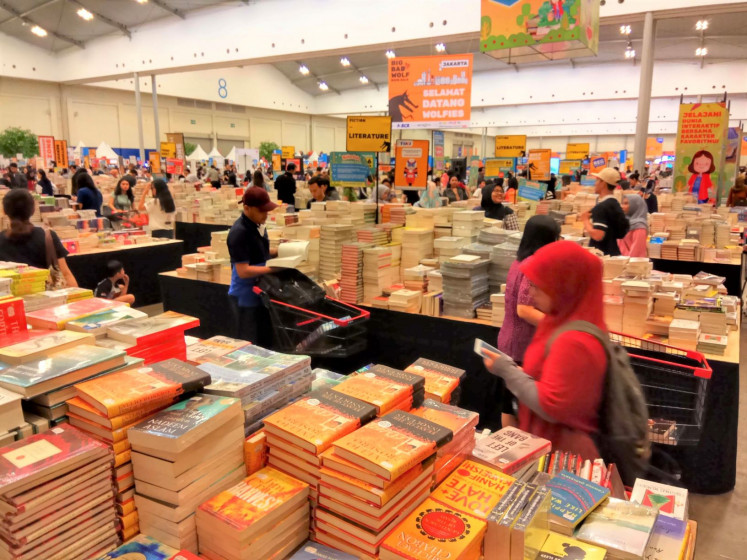Popular Reads
Top Results
Can't find what you're looking for?
View all search resultsPopular Reads
Top Results
Can't find what you're looking for?
View all search resultsLet’s read: Saving books in the time of pandemic
The Indonesian book industry is among the worst hit by the pandemic, and the lack of incentives as well as support from the government may further drag down the already low literacy rate.
Change text size
Gift Premium Articles
to Anyone
“Why would we care about the No. 48 necessity at this time?”
This sarcastic comment posted on a social media account of author Maman Suherman along with the poster for a virtual panel discussion on the need to save the book industry in this difficult time precisely describes the problems faced by the industry.
As most households are financially strapped as a result of the economic slowdown, buying books – whether physical or digital – has moved further down the priority list, a situation that has undone the many years of efforts by the industry to improve the country’s literacy rate.
In 2018, Indonesia’s adult literacy rate was 95.7 percent, an increase from 81.5 percent in 1990, or about 1.8 percent annual growth on average, mostly thanks to the intensive campaign and promotion by the industry.
According to publisher Laura Bangun Prinsloo, who chaired the National Book Committee until its disbandment in February, the government had yet to take heed of the need to ensure public access to books.
Many concerned publishers, she said, had written to the Education Ministry and the Tourism and Creative Economy Ministry on March 3 after the government allocated Rp 72 billion (US$4.8 million) for social media influencers to promote tourism at the start of the global pandemic.
“In the letter, we requested incentives that have been applied by the governments of countries with high literacy rates,” she said at the virtual panel discussion organized by publishing company Mizan and Yayasan Tujuhbelasribu Pulau Imaji on May 9.
The panel discussion, which was moderated by Maman Suherman and attended by many writers and journalists, presented Laura and Haidar Bagir of Mizan Group as the speakers.
The letter was ignored until April 3, when President Joko “Jokowi” Widodo urged for more effort to increase the literacy rate following a report from a survey held by the Programme for International Student Assessment (PISA), which showed a decline in reading interest among school students.
The report states that during the latest survey in 2018 the students’ reading comprehension scored 371 and ranked 74th worldwide.
On April 20, Laura and other publishers renewed the letter and addressed it to the President and five government offices but have yet to hear any response.
In the request letter, the book activists asked government support to facilitate free access to online reading materials, to provide funds for libraries to purchase books, and to support writers and publishers to produce health books.
“In other countries, there have been government programs that give access to the public to find reading materials on the COVID-19 phenomenon and to invite scientists and writers to publish works on health issues,” Laura said.
“If the government is serious about increasing the literacy rate then now is the best time to start something. “Although many industry players are still trying to promote reading interest by holding online writing classes or book discussions with many eager participants, there are concerns that the industry will be gone after the pandemic is over,” she said.
Turning the page: A visitor browses the display of Indonesian books at the 2016 Frankfurt Book Fair. (JP/Stevie Emilia)Although Indonesia celebrated both National Book Day on May 17 and World Book and Copyright Day on April 23, little attention was paid to the industry.
Maman said that when a publisher asked for a tax reduction recently, the request was met with a cynical response from the tax officer.
“The officer doubted the publisher, asking why no one was buying books if fast-food restaurants were still booking a high income during the pandemic,” he said.
Haidar Bagir said he didn’t expect much from the government as the industry had long been considered the least lucrative in the creative economy industry.
“We haven’t received any incentives from the government all this time. Not all industry players focus on profit per se as most of us work with a passion for books. There are much more profitable businesses than running a publishing company,” he said, adding that the net margin from book sales was around 4 percent.
Mizan, which has the largest online bookstore, saw only 20 percent of sales during the pandemic. While keeping all of the employees working from home, the company made a bold move by assigning the editors to work for promotion as well.
“I can only assume that small scale publishing companies are already out of business. The irony is that usually, the least known publishers produce serious, quality books,” said Haidar.
Bookworms: Visitors throng the Big Bad Wolf book bazaar at the ICE convention hall in Serpong on the outskirts of Jakarta, in March 2019. (JP/Ricky Yudhistira)Since the government restricted people’s movement during the pandemic, many book bazaars and exhibitions have been canceled and bookstores have been closed down – the two most effective means of book distribution.
Among them was the eagerly anticipated annual book bazaar Big Bad Wolf, which has shifted its strategy to online sales in collaboration with Mizan and online market Tokopedia.
“Since the beginning, our aim has been to increase reading interest,” said Uli T. Silalahi, the president director of Jaya Ritel Indonesia, which has organized the book event in Indonesia since 2016.
She was speaking in a related discussion panel also held by Yayasan Tujuhbelasribu Pulau Imaji on the same day via IG Live, moderated by serial entrepreneur Erlan Primansyah.
In the past four years, said Uli, the organizer had seen significant growth of visitors and the number of sales, which prompted the organizer to hold the bazaar in more cities.
This year, however, the organizing company has predicted a loss due to the small number of buyers, although online sales will continue until the end of the year, the first batch of which was held from April 27 to May 3.
“Online selling has become the most effective way to sell and distribute books nationwide. The most important thing is that we have to find a means to reach out to the public, although nothing compares to the feeling of being in a room with so many books and going through the pages before picking the ones we wish to buy,” Uli said.
All the speakers were optimistic that the book industry would survive but not thrive without support from the government.
“As the public is losing interest in reading and children are having too much screen time during the pandemic, I’m afraid that is going to be irreversible,” said Haidar.
“I can only hope that the government will focus on education and that it will trickle down to affect the book industry,” he added.
Laura said that currently, Indonesia had 60,000 new titles per year, but there was not yet institutionalized curation as the Education Ministry only focused on school textbooks.
“The evaluation matrix, however, is more on the technical side of the book such as the size and not on the content of the book. I wish there was a portal similar to the film industry’s Rotten Tomatoes where experts and the readers could evaluate a non-textbook together,” she said.
“Industry players have done much in this struggle, but it has been done sporadically. It would have a better impact if we found a solution together to get out of this situation.” (ste)













